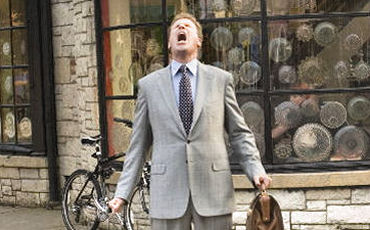Hollywood Reporter columnist Anne Thompson has penned a column about Zach Helm‘s fabled Stranger Than Fiction script, which “five studios, 37 directors and scores of movie stars threw themselves at.” I knew all about that excitement when it was happening. Everyone was creaming over that script except I couldn’t get past page 20 when I tried to read it (twice), and then I saw the finished film in Toronto and I went, “What the fuck was that about?”

Ostensibly, Fiction is about a problem afflicting IRS agent Harold Crick (Will Ferrell), which is that he’s begun to hear his life being narrated by a woman with a British accent. We gradually learn that the voice belongs to a chain-smoking writer named Kay Eiffel (Emma Thompson), who’s having lots of trouble finishing her latest book, which is largely about an IRS agent named Harold Crick. Kay is planning to kill Harold off and doesn’t quite know how. And Harold, once he gets wind of this, seeks her out and pleads with her not to kill him.
Fiction‘s problem is that it never figures out if Crick is or isn’t living inside Kay Eiffel’s head. It never makes a case for the fact that he’s existing in some imaginary realm Kay is creating as she moves along with her book, or, assuming he’s real, how and why Kay’s imaginings have any power over him.
Anyway, Thompson builds her column around conversations she had Stranger Than Fiction director Marc Forster and producer Lindsay Doran, and it reads well in that skillful, well-structured way that Thompson’s columns always read. But then you get to paragraph #13 and it’s like….my goodness! Doran and Forster actually admit to and discuss the film’s fatal flaw.
“One thing they never figured out,” writes Thompson, was”how to explain the logic of exactly how this particularly strange movie fiction works. ‘It was an ongoing conversation,’ says Doran, who sounds amazed that audiences are buying the film at all. ‘We never explain it. I kept saying to Zach, if nothing else we need a scene where somebody says, how could this be happening?’
“Forster shot one such scene, but after preview screenings he cut it. Is he a character out of a book or is he real?’ Forster asks. ‘I see him as real, an everyday man who suddenly has a narrator pop into his life. Some parts of his life are part of the book and some aren’t. Not everything has to be perfectly explained: that’s the freedom and beauty of art and fiction. For me, the title says it all — ‘Stranger Than Fiction.’ ”
Horseshit. Either you work a story out or you don’t. The central riddle in Fiction‘s story has been left open-ended and unresolved, and that’s a shame because I would’ve bought the film if Helm, Forster and Doran had just established and set the rules for Ferrell’s Crick being a character living in Thompson’s imaginary universe…or not. And if they’d gotten rid of Queen Latifah entirely. I hated every moment that Queen Latifah occupies in this film.
Woody Allen‘s story for The Purple Rose of Cairo was a lot crazier and more off-the-charts than Fiction‘s (it’s about a good-looking actor leaving a film playing on a screen in a small town and having a relationship with a female fan in the audience) but he worked out a system and stuck to it. It’s not that hard. You just have to buckle down and figure it out, and then make the crazy figured-out stuff seem inevitable, brisk and entertaining. Hello?
